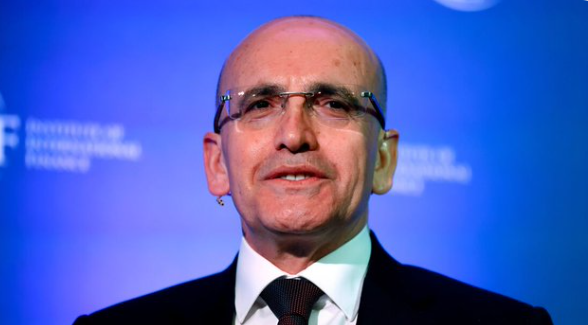Turkey’s Finance Minister, Mehmet Simsek, informed investors during a New York meeting that a strict fiscal approach will be pivotal in the country’s efforts to reduce inflation, according to an insider familiar with the discussion.
At the closed-door meeting on Tuesday, Simsek highlighted the importance of maintaining spending discipline and intensifying efforts to combat the shadow economy as key elements of the government’s strategy. He also reassured attendees that no new taxes were being planned for the foreseeable future, the source disclosed.
Simsek, along with Trade Minister Omer Bolat and Central Bank Governor Fatih Karahan, delivered this message during a conference organized by Goldman Sachs Group Inc. and the Turkey-US Business Council, held alongside the UN General Assembly in New York.
Turkey’s Finance Minister, Mehmet Simsek, has been working to reassure investors that President Recep Tayyip Erdogan has shifted toward conventional monetary policies, after years of pushing an unorthodox strategy of cutting interest rates to combat inflation. Since Turkey’s transition to tighter monetary measures last year, Simsek has been actively engaging investors in an effort to attract more foreign capital.
For the past six months, the benchmark interest rate has remained at 50% as the government attempts to cool inflation, which surged to as high as 75% earlier this year.
According to a source familiar with his comments, Simsek indicated that the delayed effects of monetary policy and a tighter fiscal stance will be the main drivers of reducing inflation. He dismissed concerns about a potential conflict between inflation control and economic growth.
On the fiscal front, investors and economists are closely monitoring key factors such as minimum wage increases and the extent of administrative price and tax hikes in 2025, which could influence inflation. Many investors are hoping for a minimum-wage adjustment that aligns with the central bank’s inflation forecasts, and is smaller than the 49% increase implemented earlier this year.
Foreign investors have shown renewed interest in Turkish assets in 2023, particularly through carry trades — borrowing in foreign markets at low rates to buy the lira — or by holding shorter-term bonds. However, foreign direct investment of around $2 billion in the first half of the year is still significantly below the average levels seen in the decade before the pandemic.
Additionally, President Erdogan addressed American businesses on Monday at an event hosted by the US Chamber of Commerce, encouraging companies, particularly in sectors like aviation and banking, to take advantage of the government’s support.
